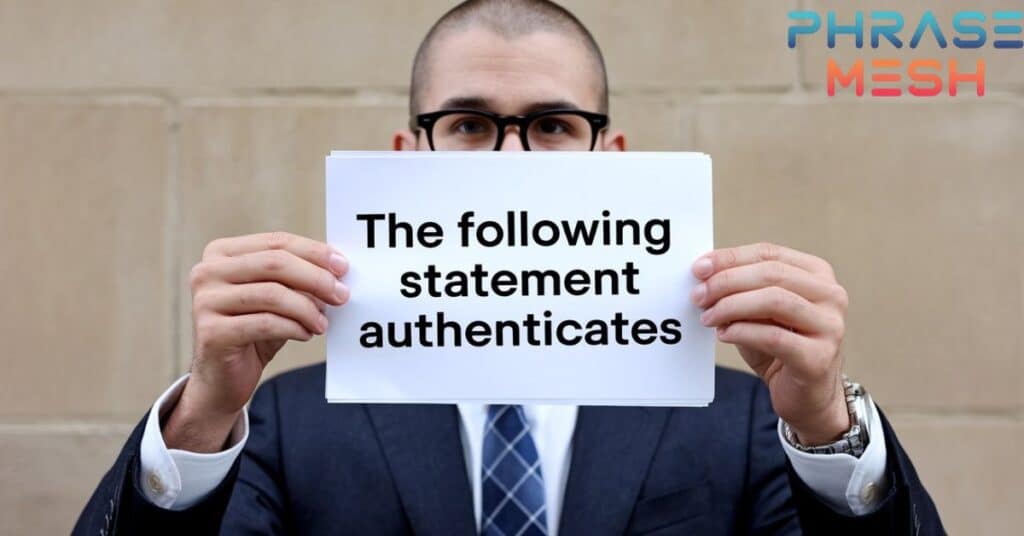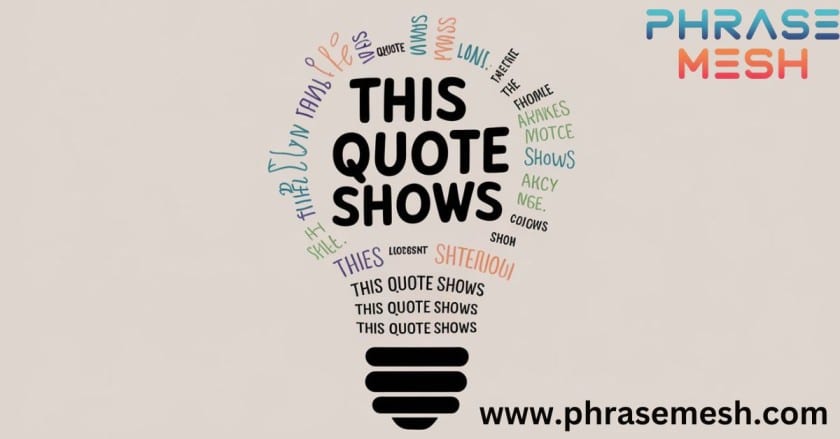Struggling to find fresh ways to say “This Quote Shows”? You’re not alone! In academic writing or analysis, repeating the same phrases can make your work feel monotonous. That’s why we’ve gathered 20 creative alternatives that will keep your writing lively and engaging.
Whether you’re working on essays, reports, or speeches, these variations will help you maintain flow and clarity without overusing “This Quote Shows.” Read on to discover examples and tips on how to effectively replace “This Quote Shows” and elevate your writing!
What To Say Instead of “This Quote Shows”
- This Quote Illustrates
- This Passage Demonstrates
- These Words Emphasize
- The Following Statement Reveals
- This Excerpt Highlights
- The Author’s Words Reflect
- This Statement Conveys
- The Following Line Captures
- This Sentiment Signifies
- The Passage Points Out
- This Selection Underscores
- The Following Extract Exemplifies
- These Lines Suggest
- The Quotation Reinforces
- This Excerpt Articulates
- The Following Words Embody
- This Reference Indicates
- The Passage Elucidates
- These Words Epitomize
- The Following Statement Authenticates
1. “This Quote Illustrates”

“Illustrates” paints a vivid picture of the quote’s significance. It’s perfect for situations where you’re drawing attention to how words create imagery or demonstrate a concept.
Example in a Literary Analysis Email:
Dear Professor Thompson,
In my analysis of “The Great Gatsby,” this quote illustrates Fitzgerald’s masterful use of symbolism: “Gatsby believed in the green light, the orgastic future that year by year recedes before us.” The imagery captures both hope and futility, highlighting the complexity of the American Dream.
Best regards, Sarah Chen
2. “This Passage Demonstrates”
Using “demonstrates” conveys authority and proves a point with concrete evidence. It works especially well in academic or professional contexts.
Example in a Business Report:
The CEO’s statement demonstrates our commitment to sustainability: “By 2025, we pledge to reduce our carbon footprint by 50%.” This bold initiative reflects our company’s values and long-term vision.
3. “These Words Emphasize”
When you want to stress the importance of specific ideas or themes, “emphasize” effectively draws attention to key points.
Example in a Speech Analysis:
“Martin Luther King Jr.’s words emphasize the urgent need for change: ‘We cannot walk alone.’ This powerful statement captures the essence of collective action.”
4. “The Following Statement Reveals”
“Reveals” suggests uncovering something significant or previously hidden, making it perfect for analyzing subtle meanings.
Example in a Research Paper:
“The participant’s response reveals the underlying challenges of remote work: ‘I feel connected to my team, yet somehow isolated.’ This contradiction points out the complexity of modern workplace dynamics.”
5. “This Excerpt Highlights”

“Highlights” works well when you want to draw attention to particularly significant elements within a larger context.
Example in a Movie Review:
“This scene’s dialogue highlights the film’s central theme: ‘We all wear masks, metaphorically speaking.’ The line’s impact resonates throughout the story.”
6. “The Author’s Words Reflect”
Using “reflect” suggests thoughtful consideration and deeper meaning, perfect for literary analysis.
Example in a Book Club Discussion:
Dear members, Austen’s description reflects the social constraints of her time: ‘A woman’s reputation is no less brittle than it is beautiful.’ This observation signifies the delicate balance women had to maintain in Regency society.
7. “This Statement Conveys”
“Conveys” works beautifully when discussing how ideas or emotions are communicated.
Example in a Poetry Analysis:
“Emily Dickinson’s lines convey the profound isolation she experienced: ‘The soul selects her own society.’ The metaphor captures her deliberate solitude.”
8. “The Following Line Captures”
Perfect for discussing how words encapsulate complex ideas or emotions succinctly.
Example in a Film Studies Essay:
“The character’s final words capture the movie’s essence: ‘Tomorrow is another day.’ This simple phrase reflects both hope and resilience.”
9. “This Sentiment Signifies”
Use “signifies” when you want to explain the deeper meaning or symbolism behind words.
Example in a Cultural Analysis:
“This proverb signifies the value of patience in Japanese culture: ‘Fall seven times, stand up eight.’ The saying demonstrates the importance of perseverance.”
10. “The Passage Points Out”

This phrase works well when you want to direct attention to specific observations or criticisms.
Example in a Journalism Critique:
“The reporter’s observation points out the systemic issues: ‘Behind the statistics lie countless untold stories.’ This perspective highlights the human element often missing from data-driven reporting.”
11″This Selection Underscores”
Perfect for emphasizing crucial ideas or themes within a text.
Example in an Academic Essay:
Dear Dr. Martinez, Shakespeare’s soliloquy underscores the psychological turmoil of his protagonist:
“To be or not to be.” This internal debate illustrates the complexity of human decision-making.
12. “The Following Extract Exemplifies”
Use this when you want to present a perfect example of a concept or theme.
Example in a Business Presentation:
The customer testimonial exemplifies our brand’s impact:
“Your service transformed how I run my business.” This feedback reflects our commitment to client success.
13. “These Lines Suggest”
Ideal for subtle interpretations or when discussing implied meanings.
Example in a Film Review:
The character’s final words suggest an unresolved conflict:
“I’ll think about it tomorrow.” This ambiguous ending highlights the story’s psychological depth.
14. “The Quotation Reinforces”
Effective when strengthening an argument or supporting a previous point.
Example in a Research Analysis:
The expert’s statement reinforces our findings:
“Climate patterns have shifted dramatically.” This observation emphasizes the urgency of environmental action.
15. “This Excerpt Articulates”

Perfect for instances where precise expression or clarity is noteworthy.
Example in a Literary Journal:
Woolf’s passage articulates the essence of modern alienation:
“In crowds I feel alone.” This sentiment captures the paradox of urban life.
16. “The Following Words Embody”
Use when a quote perfectly represents or gives form to an abstract idea.
Example in a Philosophy Paper:
Plato’s allegory embodies the concept of enlightenment:
“They see only shadows of reality.” This metaphor conveys the challenges of perceiving truth.
17. “This Reference Indicates”
Useful for pointing out evidence or drawing connections.
Example in a Historical Analysis:
The diplomat’s letter indicates growing tensions:
“Peace hangs by a thread.” This warning signifies the delicate nature of international relations.
18. “The Passage Elucidates”
Ideal for quotes that clarify or shed light on complex ideas.
Example in a Scientific Report:
Einstein’s explanation elucidates the theory’s importance:
“Everything should be made as simple as possible, but no simpler.” This principle demonstrates the value of clear communication in science.
19. “These Words Epitomize”
Perfect for when a quote perfectly summarizes or represents a broader concept.
Example in a Social Commentary:
The activist’s statement epitomizes the movement’s spirit:
“Change begins with a single step.” This message points out the power of individual action.
20. “The Following Statement Authenticates”

Use when a quote provides validation or proof of an argument.
Example in a Legal Document:
The witness testimony authenticates our position:
“I saw it with my own eyes.” This firsthand account reflects the credibility of our case.
Tips for Implementation:
- Consider the tone of your document when selecting phrases
- Match the formality level to your audience
- Use these alternatives to add variety and maintain reader interest
- Remember the importance of context when introducing quotes
- Pay attention to how each phrase affects the impact of your quotation
Best Practices:(This Quote Shows)
- Vary your word choice throughout longer documents
- Consider the complexity of your subject matter
- Ensure your transitions feel natural, not forced
- Connect quotes to your broader arguments
- Maintain clarity while adding sophistication
The Art of Quote Integration:
Remember that introducing quotes isn’t just about variety – it’s about choosing phrases that enhance understanding and engagement. Each alternative should:
- Support your analysis
- Guide reader interpretation
- Add value to your discussion
- Maintain flow and readability
- Emphasize key points effectively
Whether you’re writing academic papers, professional reports, or creative analyses, these additional alternatives will help you discuss quotations with greater precision and style. The key is choosing phrases that both serve your purpose and resonate with your audience while maintaining the natural flow of your writing.
Frequently asked questions:
1. Why should I avoid repeating “This Quote Shows” in my writing?
Repeating “This Quote Shows” can make your writing sound dull and repetitive. Using alternatives keeps your work fresh and engaging.
2. What are some creative ways to say “This Quote Shows”?
You can use phrases like “This statement reveals” or “This passage highlights” to convey the same idea more dynamically.
3. How do I choose the best alternative for “This Quote Shows”?
Choose alternatives based on the context and tone of your writing. The right phrase will enhance clarity and impact.
4. Will using alternatives to “This Quote Shows” improve my writing?
Yes! It keeps your writing varied and professional, making it more enjoyable for readers and demonstrating your range of expression.
5. Can I use “This Quote Shows” alternatives in academic writing?
Absolutely! Using a mix of alternatives can make your academic papers stronger and more compelling without sounding repetitive.





